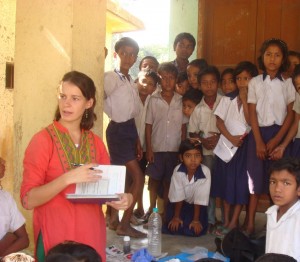Contact

Caroline testing arsenic levels in groundwater at a rural school in West Bengal, India, during her field work in Fall 2014
Caroline Delaire, +254-739-384-197 (Kenya) | carolinedelaire.h2o@gmail.com
Education
University of California, Berkeley
Ph.D. Civil & Environmental Engineering, May 2016
University of California, Berkeley
M. Sc. Civil & Environmental Engineering, May 2012
Ecole Polytechnique, Paris, France
Engineering degree in Mechanics and Physics for Energy and Environment, Master level, July 2011
Research Interests
- Development of low-cost, robust and effective technologies for the removal of chemical (arsenic, fluoride, nitrate) and microbial (bacteria, viruses) contaminants from drinking water
- Mechanisms of contaminant removal and effect of water composition on treatment processes
- Behavior change in resource-constrained communities with respect to the adoption of water and sanitation technologies
- Innovative sanitation technologies and business models suitable for low-income settings, especially urban slums
Honors and Awards
- Explore travel grant awarded by the Development Impact Lab of USAID for the project “Identifying social drivers of safe water consumption in arsenic-affected areas in West Bengal”, April 2014
- International Fellowship of the American Association of University Women, August 2012-May 2013
- Runner-Up prize for the 2012 Dow Sustainability Innovation Student Challenge Award at UC Berkeley: “A socially sustainable water solution for poor communities – Simultaneous removal of arsenic and waterborne pathogens by electrocoagulation”, November 2012
- Outstanding Leadership Award from the Ecole Polytechnique (France) in recognition of the work as President Polytechnique’s association for social action.
PhD Research
-
My PhD research focuses on access to safe water in West Bengal, India, with two interdisciplinary components: an engineering component on the removal of arsenic and bacteria from contaminated groundwater with a process called iron electrocoagulation, and a social science component investigating behavior change and the use of alternatives to contaminated groundwater in arsenic-affected communities. My PhD led me to conduct both lab work (to understand the mechanisms of contaminant removal) and field work (to conduct a 500-household survey).
- I’m also working as a part-time research analyst for the Aquaya Institute on their Monitoring for Safe Water program. I help conduct a qualitative analysis of the drivers and barriers (technical, logistical, financial and institutional) to water quality monitoring by utilities and health surveillance agencies in six African countries.
Teaching
- Water Chemistry, CE 115, upper undergraduate level class in Civil and Environmental Engineering at UC Berkeley. Outstanding Graduate Student Instructor Award and Teaching Effectiveness Award from the UC Berkeley Teaching Center. Fall 2013
- Design for Sustainable Communities, CE 209, graduate level class in Civil and Environmental Engineering at UC Berkeley. Spring 2016
Publications
- Delaire, C.; Das, A.; Amrose, S.; Gadgil, A. J.; Roy, J.; Ray, I. Determinants of the Use of Alternatives to Arsenic-Contaminated Shallow Groundwater: an Exploratory Study in Rural West Bengal, India. Accepted in the Journal of Water and Health (April 2017).
- Cherukumilli, K.; Delaire, C.; Amrose, S.; Gadgil, A. J. Factors Governing the Performance of Bauxite for Fluoride Remediation of Groundwater. Sci. Technol. 2017, 51(4), 2321–2328.
- Delaire, C.; Amrose, S.; Zhang, M.; Hake, J.; Gadgil, A. J. How Do Operating Conditions Affect As(III) Removal by Iron Electrocoagulation? Water Research. 2017, 112, 185-194.
- Delaire, C.; van Genuchten, C. M.; Amrose, S. E.; Gadgil, A. J. Bacteria Attenuation by Iron Electrocoagulation Governed by Interactions between Bacterial Phosphate Groups and Fe(III) Precipitates. Water Research. 2016, 103, 74-82.
- Delaire, C.; van Genuchten, C. M.; Nelson, K. L.; Amrose, S. E.; Gadgil, A. J. Escherichia coli Attenuation by Fe Electrocoagulation in Synthetic Bengal Groundwater: Effect of pH and Natural Organic Matter. Sci. Technol. 2015, 49, 9945–9953.
- Dubrawski, K. L.; van Genuchten, C. M.; Delaire, C.; Amrose, S. E.; Gadgil, A. J.; Mohseni, M. Production and transformation of mixed-valent nanoparticles generated by Fe(0) electrocoagulation. Sci. Technol. 2015, 49, 2171–2179.
- Amrose, S. E.; Bandaru, S. R. S.; Delaire, C.; van Genuchten, C. M.; Dutta, A.; DebSarkar, A.; Orr, C.; Roy, J.; Das, A.; Gadgil, A. J. Electro-chemical arsenic remediation: field trials in West Bengal. Total Environ. 2014, 488-489, 539–546.
Links featuring Caroline
- http://redefiningbusiness.org/safe-water-consumption-in-arsenic-affected-areas-of-rural-india-an-engineer-explores-behavior-change/
- Caroline’s PhD “exit talk” on February 12th, 2016, at the Environmental Engineering Seminar, UC Berkeley